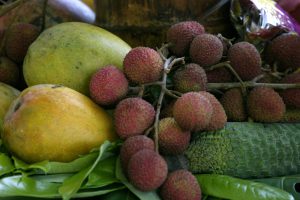
by Judy Corbus | Jul 5, 2019

Visit places close to home for a vacation that won’t break the budget. (Photo source: UF/IFAS)
“Summer” and “vacation” seem to go hand-in-hand, as school is out and schedules are a little more laid back. Now that summer is here, you may be making plans for a getaway to your favorite spot. Perhaps, you are saving up for that dream trip next summer but you’d still like to take a break and have some fun this year. How can your family and you enjoy yourselves without breaking the bank? The answer might be right in your own backyard!
- Plan a staycation. Rather than traveling out of the area, use your home as base and plan some fun activities – family game time, camping out in the backyard and making s’mores, or running through the sprinklers and having a water balloon fight. Or just relax with a good book and a glass of lemonade or catch a few zzzs under a tree. The key is to turn off the devices, forget about work, and not worry about projects around the house – they will be there after you “return.”
- Plan day trips. These can be a part of your staycation, too. If you live fairly close to the beach, pack the car and head out early to enjoy the surf before temperatures rise. Make a day of it by enjoying the sunset before heading home. State parks also offer hiking and biking trails, boating and canoeing, swimming, playgrounds, picnic areas, and other fun activities. Florida boasts of 175 state parks, trails, and historic sites around the state so your next adventure may be just a short drive away. Check out https://www.floridastateparks.org/ for a park near you.
- Check out local events. Libraries and museums often feature special exhibits for free or a nominal charge. Several years ago, I visited a traveling exhibit about the Titanic at an arts center an easy drive from home. It made for an enjoyable and educational afternoon! Contact your local library or museum for a schedule of summer program offerings.
- Take part in a service project. A number of families are opting to use some of their vacation time to help others in need in their communities – projects include yard work, painting, basic home repairs, assisting with a food pantry/clothes closet, and serving meals to the homeless. These projects may be sponsored by a community service organization or church. During this past spring, local media outlets reported on several groups of college students representing campus ministries, fraternities, and other organizations who volunteered their Spring Break time to assist with Hurricane Michael clean-up and recovery. Participating in a service project as a family can be a meaningful way to give back to the community and make a difference locally. Contact your place of worship or local service organizations for opportunities in your area.
This summer, “recharge” without a super charge to your wallet!
Source: https://www.daveramsey.com/blog/i-need-a-staycation

by Samantha Kennedy | Jul 2, 2019

Picnics are a great way to share food and fun with friends and family. By following a few simple food safety tips, you can make sure foodborne illness doesn’t crash your party. (Photo source: UF/IFAS file photo)
There are few things more iconic during summer than a picnic. There’s just something fresh and fun about sharing a meal in the park or at the beach with family and friends. But just because you’re enjoying the warm, gentle breeze doesn’t mean you should throw caution to the wind. By following a few simple food safety tips, you can ensure that your perfectly planned picnic doesn’t make you sick.
Plan appropriately. Not all foods are picnic-appropriate. Anything that requires a lot of perishable ingredients and/or a lot of preparation should be avoided. Stick with foods that require little or no cooking and that contain just a few ingredients. Foods such as fruits and vegetables (especially whole ones), hard cheeses, peanut butter and jelly, cereal, bread, and crackers are ideal picnic items. Anything made with commercially processed custard or mayonnaise will stay safe as long as it is kept cold.
Pack it safely. Use a cooler, if possible, and store cold foods together so they can help each other stay colder longer. Use ice or frozen gel packs to help keep foods cold. Pack foods directly from the refrigerator into the cooler; don’t leave them sitting out before packing. Store ready-to-eat foods separately from raw meats. If packing up hot foods, be sure to keep them in a thermos or other insulated dish. DO NOT store them in the same container as the cold foods. Paper towels, disposable utensils, and a food thermometer are ideal picnic accessories. Remember, keep cold foods below 41 degrees F and hot foods above 135 degrees F. Do your best to keep the cooler away from direct sunlight by storing it in the shade and be sure to replenish the ice and/or frozen gel packs when they melt. If possible, store drinks in a separate cooler so cold foods are not exposed to warm air with frequent openings of the lid to retrieve drinks. This also reduces the risk of cross-contamination, with fewer hands reaching into the food cooler.
Prepare it carefully. All food items should be kept at the proper temperature at all times. When cooking raw meats, use separate plates for the raw and cooked products and clean and sanitize utensils between uses. Cook meat to the proper recommended internal temperature to ensure doneness and safety. Click here for a list of recommended internal cooking temperatures.
Clean up quickly. Discard any perishable foods that have been left out for longer than two hours. In really hot weather (generally above 90 degrees F), foods should not be left out longer than one hour. Keep food protected in storage containers such as coolers and lidded dishes to minimize contamination from flies and other pests. Serve small portions of food at a time and keep the rest in the cooler.
Picnics are an important part of summer and with just a little bit of planning and a few useful tips and tools, they can be safe and delicious for everyone!
Related links:
Food Safety at Tailgating (University of Florida/IFAS)
Picnic Safety (Iowa State University)
Checklist for the Perfect Summer Picnic (foodsafety.gov)
Extension classes are open to everyone regardless of race, creed, color, religion, age, disability, sex, sexual orientation, marital status, national origin, political opinions or affiliations.

by Kendra Hughson | Jun 20, 2019
I know I am not the only one fed up with the robocall madness. I no longer answer calls from numbers I do not recognize, and I block known scam numbers. These tactics don’t stop the incoming calls, though. I am often left with a voicemail box full of spam. Occasionally, I miss calls from people I know. More often, my voicemail is full of insurance, credit card, technology support, and IRS scams. The scammers are sophisticated, and some people have fallen victim to these fraud schemes. The best strategy is to hang up on these calls.

Check with your cell phone carrier for call filtering services. Photo Source: Kendra Zamojski
Here are some steps you can take to stop the madness:
- Sign up for the Do Not Call Registry at https://www.donotcall.gov/. You can also report unwanted calls on this website. Adding your phone numbers to the Do Not Call list doesn’t stop some organizations from legally contacting you and, of course, unscrupulous callers don’t care about the Do Not Call list.
- Never give out your personal information over the phone. Never give your Social Security Number, account numbers, passwords, or other sensitive personal data over the phone.
- Check your mobile phone for built-in features. You can use phone number blocking, do not disturb, or other features to stop the unwanted robocalls.
- Check with your mobile phone carrier to see what services they offer. Some carriers offer call filtering apps for free or for a small fee.
- Download a third-party call filtering app. Some apps are available for free and others have one-time or monthly fees. Comparison shop to find the solution that best fits your needs.
For more information contact your local UF/IFAS Extension Office: http://sfyl.ifas.ufl.edu/find-your-local-office/
Sources:
How to Stop Unwanted Calls: https://www.consumer.ftc.gov/features/how-stop-unwanted-calls

by Heidi Copeland | Jun 20, 2019
Part of cultivating a healthy, sustainable food system is to learning eat seasonally and locally. This means enjoying foods at their seasonal peak. In addition, there is value knowing when produce items are in season as these products are often tastier, healthier, fresher and more economical. Additionally, eating seasonally encourages a varied diet.
According to the Florida Department of Agriculture and Consumer Services (FDACS), Fresh From Florida produce is plentiful! The month of June is especially productive! June claims: Fresh From Florida avocado, cantaloupe, carambola, eggplant, guava, lychee, mango, mushroom, oranges, papaya, passion fruit, peanut, potatoes, sweet corn, tomatoes and watermelon!

Tropical Fruit Day, 2005. UF/IFAS Photo Source: Thomas Wright.
Most of the listed produce items are pretty conventional. But what about something not so straightforward like the lychee?
The lychee (Litchi chinensis), linked to the Sapindus genus, is native to warm temperate tropical regions of southern China. The lychee is harvested ready to eat. The lychee is covered with a hard, non-edible covering and contains a crisp, juicy, sweet pleasant inner (tasting a bit like a cross between a strawberry and a grape). Lychee are a great source of nutrients, containing, energy (carbohydrates) as well as vitamins, minerals and fiber. Lychee can be consumed fresh off the tree, frozen, canned, pickled, dried or even as ingredients in salads, marinades, sauces or desserts.
Try it! You just might like it! The University Florida UF/IFAS Extension has a great publication if you are interested in growing lychee. https://edis.ifas.ufl.edu/pdffiles/MG/MG05100.pdf The World Wide Web has a plethora of interesting recipes for the lychee as well that you can check out.
Lychee Growing in the Florida Home Landscape https://edis.ifas.ufl.edu/pdffiles/MG/MG05100.pdf
Florida Crops in Season https://www.freshfromflorida.com/Consumer-Resources/Buy-Fresh-From-Florida/Crops-in-Season

by Laurie Osgood | Jun 7, 2019
 What is Stress Anyway?
What is Stress Anyway?
The traffic is awful, a report is due, the laundry is piling up, and the kids are fighting. Life is full of stress! According to the National Institute of Mental Health, stress is how the brain and body respond to any physical, mental, and/or emotional demand. Not all stress is bad. For example, stress can help motivate us to get things done. When faced with a threat or stressful event, our bodies produce hormones such as epinephrine, which can cause a temporary rise in our heart rate and blood pressure. Chronic, un-managed stress can cause long-term symptoms including headaches, high blood pressure and even problems sleeping.
Identify the Sources of Stress in Your Life
Feeling stressed is normal, but some people cope with stress better than others. Our thoughts, lifestyle and emotions can affect how much stress we endure. We must identify the causes of our stress before we can begin to manage them. Although the causes of stress are similar for both men and women, it is how we recognize and manage our stress that makes us different.
Common Causes of Stress:
• Work or unemployment
• Money, finances
• Drug or alcohol abuse
• Family breakdown
• Health issues
• Major life changes
What are the Symptoms of Stress?
Our bodies automatically respond to stressors in our lives. However, constant and uncontrolled stress can lead to serious physical and mental consequences. No matter how stressful your life seems, we must recognize the warning signs of stress and take action.
Watch out for the following warning signs:
• Feeling tired, not sleeping properly
• Loss of concentration and an inability to complete projects
• Irritability, low self-esteem or mood swings
• Feeling tense or anxious
• Feeling unmotivated
• Withdrawing from family and friends
• Excessive drinking and/or drug use
• Physical signs such as headaches, chest pains, high blood pressure, digestive problems or aches and pains
Men and Woman Handle Stress Differently
How stress affects you may depend upon your gender. Men and women recognize and react to stress in different ways, both mentally and physically.
When feeling stressed, women reach out to friends and family. They seek support to lower their stress and find a solution to their challenges. By talking about their emotions, women are able to process their feelings and share the pressure of their situation.
When men experience stressful situations, they are likely to hide their feelings or change the subject to escape a stressful situation. Men find it hard to talk about their feelings or ask for help when faced with pressures from their job, family issues or money worries. Men prefer to play sports or listen to music to manage stress.
Stress Reduction Strategies for Men and Women
Stress is a normal part of life, but chronic stress can be bad for our health. Stress management means taking control of your thoughts, emotions, and lifestyle. Making simple changes in your life such as maintaining a network of close friends, exercising, eating a healthy diet, and getting enough sleep can help reduce your overall stress.
Resources:
The American Psychological Association: https://www.apa.org/news/press/releases/stress/2010/gender-stress
The National Institute of Mental Health: https://www.nimh.nih.gov/health/publications/stress/index.shtml
The Electronic Data Information Source of UF/IFAS Extension. EDIS: https://edis.ifas.ufl.edu/pdffiles/FY/FY51700.pdf
To learn more about how to cope with stress, contact Laurie Osgood, Family and Consumer Sciences Agent at the UF/IFAS Extension Office in Gadsden County (850) 875-7255 or Osgoodlb@ufl.edu


by Ginny Hinton | Jun 4, 2019
America’s favorite superfood is ripe in the Florida Panhandle! Well, it may not actually be everyone’s favorite, but it’s definitely a tasty superfood. Of course, I’m talking about the blueberry. If you love the sweet nutritious little blue fruit, now is the time to pick or purchase fresh from a local source.

Blueberries: Spectacular, Summer, Superfood
Photo source: Ginny Hinton
When it comes to antioxidants, blueberries are king. Antioxidants help protect our bodies from oxidative stress, which is linked to many diseases including arthritis, heart disease, stroke, and high blood pressure. They also help strengthen our immune system. Blueberries have one of the highest antioxidant levels of all common fruits and vegetables.
Blueberries are high in fiber (about 4 grams per serving), vitamin C and vitamin K. Of course, they’re also low in calories. Blueberries are available fresh in the Panhandle from late May into June.
When you’re picking blueberries, look for ones that are firm, dry, plump and smooth-skinned with a light greyish bloom. Stick to the deep blue ones for the sweetest flavor. Cover them and they’ll stay fresh in the refrigerator for up to ten days, or they can be easily frozen. Put them in a single layer on a baking sheet or cookie tray and freeze, then store them in airtight, resealable plastic bags. That way, they won’t stick together and you can use just the amount you need. Once you thaw them out, just be sure to use them within three days. Store blueberries unwashed and don’t rinse them until you’re ready to use them.
Don’t love to eat them plain? Nutritious, delicious blueberries are great in lots of dishes. For a quick breakfast or snack, add them to yogurt or cottage cheese and enjoy! Use them to flavor pancakes, waffles or muffins. Add them to a green salad for a sweet flavor burst. However you eat them, know that you’re doing a good thing for both your health and your taste buds.
Enjoy blueberries!













